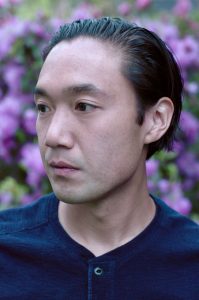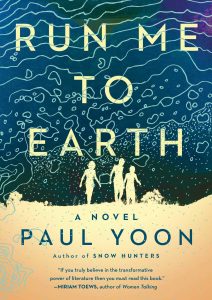The PEN Ten: An Interview with Paul Yoon
The PEN Ten is PEN America’s weekly interview series. This week, Jared Jackson speaks with Paul Yoon, author of the forthcoming Run Me to Earth (Simon & Schuster, 2020).

Photo by Peter Yoon
1. What does your creative process look like? How do you maintain momentum and remain inspired?
Truthfully, I don’t write all that much. Certainly not every day. Drafting, in fact, begins in my head, and I keep doing that—forming characters and the shape of a narrative in my mind until I can start zooming in and seeing paragraphs and scenes. I do this while running. I run almost every day. Or I’ll do it while walking my dog, or while he’s asleep beside me. He’s my best writing mate.
2. What is one book or piece of writing you love that readers might not know about?
So many, that it feels a bit sneaky to single one out—like I’m cheating on the others. Writers hardly ever mention Platonov when they talk about the Russians. He is one of my favorites. His novella, Soul, remains one of the strangest, mystical, mythical pieces of writing I’ve ever read.
“Those are my favorite kinds of books—they startle me into stillness.”
3. What is your favorite bookstore or library?
I’ll always make an effort to visit McNally Jackson on Prince Street when I’m passing through NYC. I think all bookstores should arrange their fiction titles by country—that makes sense to me, because that’s how I think about works of fiction, of writers and books I hold dear.
4. What is the last book you read? What are you reading next?
I just finished Marian Engel’s Bear for the first time—amazing. I’m reading John Keene’s Counternarratives right now. I love that it is both wild and disciplined. Those are my favorite kinds of books—they startle me into stillness.
5. How does your identity shape your writing? Is there such a thing as “the writer’s identity?”
Hard to answer this one, because my writing life is my identity. I’m married to a writer, so even our relationship is a part of this. My friends are a part of this. My dog is a part of this—he helps me compose, as I mentioned. It’s just all me.
“I felt like I was leaping too many times into abysses, at every page, and kept on having to convince myself to keep going. Wondering if I could capture a corner of history with respect and honor, and if it could eventually grow and become more than the story—if it could hold many stories.”
6. What is the most daring thing you’ve ever put into words? Have you ever written something you wish you could take back?
 I don’t wish I can take it back, but the scariest thing I’ve written is the book that just came out, Run Me to Earth. I wrote it in a state of distress and uncertainty, a lot more than my other books. I felt like I was leaping too many times into abysses, at every page, and kept on having to convince myself to keep going. Wondering if I could capture a corner of history with respect and honor, and if it could eventually grow and become more than the story—if it could hold many stories.
I don’t wish I can take it back, but the scariest thing I’ve written is the book that just came out, Run Me to Earth. I wrote it in a state of distress and uncertainty, a lot more than my other books. I felt like I was leaping too many times into abysses, at every page, and kept on having to convince myself to keep going. Wondering if I could capture a corner of history with respect and honor, and if it could eventually grow and become more than the story—if it could hold many stories.
7. What advice do you have for young writers?
Travel, if you can. Share moments with strangers. Tweet less. Read. Figure out that discipline you need to write—doesn’t have to be every day, but you should be able to turn it on when you need to. Care less about graduate schools, degrees, teaching jobs, cover letters. Love animals.
8. Which writers working today are you most excited by?
This is like that one book question! I know I won’t be able to list them all here: I’m awestruck by Atticus Lish, J. M. Ledgard, Jenny Erpenbeck, Miriam Toews, and Nadeem Aslam.
“Through stories, I can consider and learn about someone in another continent, or even a stranger sitting next to me on the subway. I can think of our history, collective and individual, and I can think of our suffering, joys, victories, and all the small moments and big ones—of events, physicality, love, and places. Nothing else can do what stories can do for me: they are vast, elastic, personal, intimate—it’s all there.”
9. Which writer, living or dead, would you most like to meet? What would you like to discuss?
I was lucky enough to shake Michael Ondaatje’s hand twice in my life, and his work has had such a profound impact on me that both times I wasn’t able to speak. He must think I’m a total doofus. So, I would like to actually hang out with him one day. Maybe talk about nothing at all, but just hang out with him, do something kind of silly with that great writer. Go bowling or play miniature golf. I bet he’s an amazing miniature golfer.
10. Why do you think people need stories?
I’m not sure what other people need, but I know why I need stories. They are the highways, routes, and connective tissue to this world. Stories help me access the world, respect the world. Through stories, I can consider and learn about someone in another continent, or even a stranger sitting next to me on the subway. I can think of our history, collective and individual, and I can think of our suffering, joys, victories, and all the small moments and big ones—of events, physicality, love, and places. Nothing else can do what stories can do for me: they are vast, elastic, personal, intimate—it’s all there. I’m a better person because of stories.
Paul Yoon is the author of two story collections, Once the Shore, which was a New York Times Notable Book, and The Mountain, which was a NPR Best Book of the Year. His novel, Snow Hunters, won the Young Lions Fiction Award. A recipient of fellowships from the New York Public Library’s Cullman Center for Writers and Scholars and the National Endowment for the Arts, he lives in Cambridge, Massachusetts with his wife, the fiction writer Laura van den Berg, and their dog, Oscar.






